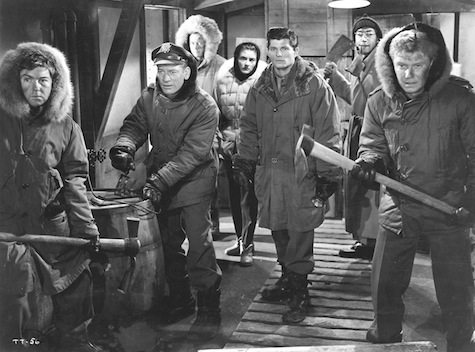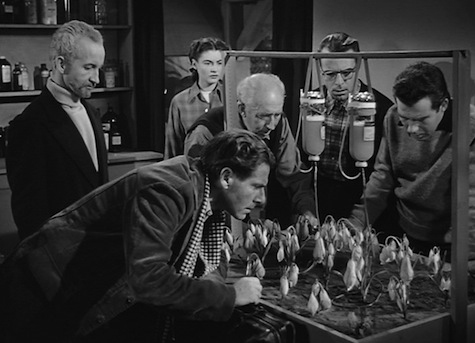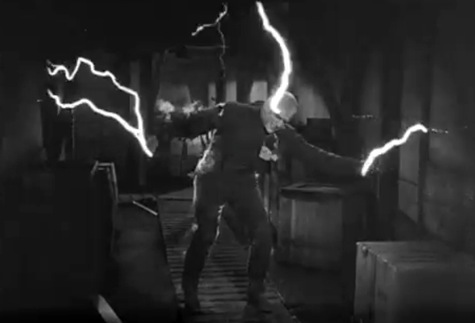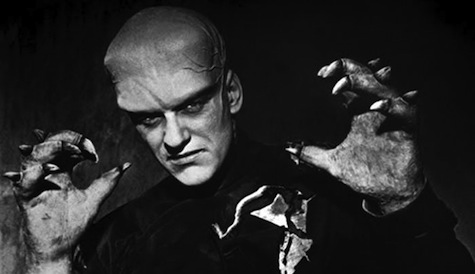“I’ve tried to tell you before, scientists have always been pawns of the military.”
I can’t speak to the relationship between scientists and military personnel in Starfleet, but David’s warning to his mother, Dr. Marcus, in Star Trek II: The Wrath of Khan neatly underlines the antagonism between the eggheads and the meatheads in so much of science fiction. The scientists see the military as a bunch of trigger-happy morons, while the soldiers see the scientists as a bunch of troublemaking nerds who do more harm than good.
You can probably trace the intensity of this mutual distrust back to the dawn of the atomic age, when the militarization of science produced the means to kill everyone on earth. The animosity is certainly on full display in one of the key science fiction films of that era, 1951’s The Thing From Another World. In the film, scientists and Air Force officers stationed at the North Pole discover a wrecked UFO. They uncover a body encased in ice near the wreckage and transport it back to their base just before a storm blows in and cuts them off from the outside world. Then, of course, the thing in the ice thaws out.
On the surface, this is just the standard Us Against The Creature business. Aside from the threat posed by the rampaging Thing itself, however, the main source of tension in the film comes from the battle of wills between the lead scientist, Dr. Arthur Carrington (Robert Cornthwaite) and the ranking Air Force officer Captain Patrick Hendry (Kenneth Tobey). Dr. Carrington wants to study the Thing. Hendry pretty much just wants to kill it.

Unsurprisingly, the film sides with Hendry. The only real ambition this film has is to be entertaining, and brave heroes battling a mindless monster at the North Pole is pure popcorn fare. The Thing From Another World was produced by the great Howard Hawks. One of the undisputed giants of motion pictures, Hawks directed masterpieces across a wide spectrum of genres, including screwball comedies (His Girl Friday, Bringing Up Baby), romantic adventure (Only Angels Have Wings, To Have And Have Not), film noir (The Big Sleep) and westerns (Red River, Rio Bravo). He didn’t direct The Thing From Another World—he assigned that task to his editor Christian Nyby—but he produced it through his company Winchester Pictures.
The movie certainly feels like something that has come from a production company named after a Western rifle (Winchester was also Hawks’ middle name). Like so many Hawks pictures it is about decisive, strong-willed men in a pitched battle for their lives. The screenplay by Charles Lederer (with uncredited assists from Hawks and Ben Hecht) was loosely based on the novella “Who Goes There?” by John W. Campbell. The plot was simplified—as was the nature of the Thing itself—and the characters were brought more in line with the usual Hawksian he-man protagonists. The Hawksian hero doesn’t stop to consider his actions. He just acts, usually with good outcomes.

Having said that, however, the film handles the scientists led by Dr. Carrington in a way that, while clearly presenting them as being in the wrong, nevertheless gives them the benefit of a perspective. Hawks was asked once in an interview if he was criticizing the scientists. He answered:
Oh, it just worked out that way. We had to make it plausible why they let the Thing live, and we did that by turning the scientists into heavies. But it had to be an honest sort of dedication on their part.
That “honest sort of dedication” comes across in the film. Dr. Carrington is clearly fascinated with the visitor from another planet. “There are no enemies in science, only phenomena to be studied,” he argues. While the soldiers are driven by emotion, the good doctor is driven by a desire to understand the workings of the universe. He’s clearly willing to sacrifice for it, too, noting at one point that “Knowledge is more important than life.”
Here’s where The Thing From Another World, in its goofy sci-fi horror romp kind of way, gets at an almost irresolvable tension in the modern world. Captain Hendry wants only to live. Doctor Carrington wants only to understand. The movie sides with Hendry because, as Hawks once told another interviewer, “The best drama for me is the one which shows a man in danger[…]To live or to die. What drama is greater?” Fair enough, the struggle to survive is indeed the essence of good drama. But the doctor has a point, too, doesn’t he? Within the simplified structure of the story here, the doctor is the only one who seems to hold any interest in what a being, with the technological capacity to transverse the stars, might be thinking.
Of course, in the end, he’s just thinking “Mm. Kill. Kill.” The nature of the Thing is much changed from Campbell’s story, and he’s been turned into something that reminds me of Alan Moore’s regenerating-vegetable man take on Swamp Thing. Only dumb. And evil. And bloodsucking.

Dr. Carrington is presented as a villain—as scientists so often are in these kinds of movies—because he’s too brainy to see the obvious truth that the Thing is a monster rather than a superior life form. The root of his obtuseness is revealed in a bit of throwaway dialogue where he praises the Thing by saying, “Its development was not handicapped by emotional or sexual factors.” Actor Robert Cornthwaite puts a lusty sort of spin on this line, as if savoring the idea of being free from emotional and sexual complications.
The film presents this as a contrast to Captain Hendry who is chasing Carrington’s secretary Nikki (played by Margaret Sheridan). While Hawks movies are obsessively male-centric, his few female characters tend to be smart and strong. Though he’s a man of action, Hendry seems flustered around Nikki, and the two share an odd scene where she ties him up and feeds him as part of a kinky game. In the end, however, Hendry slips free of his ropes—a sign perhaps that a man of action ultimately knows how to manage sex and emotion in a way that the intellectual cannot.
Psychosexual readings aside, The Thing From Another World presents a world that is caught in the unsteady balance between Us and Them—that is to say, between the normal people and the people who are a little too brainy for their own good. There’s still a strand of this thinking in popular sci-fi (something like Transcendence, for instance), but it has its counterbalance in films that present the he-men as more of the problem (something like Avatar leans this way). It is a conflict that doesn’t look to be resolved any time soon. In fact, to hear David Marcus tell it, it’s still going to be a problem in the 23rd century.
Jake Hinkson is the author of the novels Hell On Church Street and The Posthumous Man, as well as the novella Saint Homicide. Read more about him at JakeHinkson.com and his blog, The Night Editor.















I have tried, but I simply cannot get into this movie. The 1982 remake is a much better film that is truer to the source material. And it is not that I do not like films of that era; Them! is one of the greatest films of all time. It is just that I did not feel like this film had the intelligence of Them! or the emotional power of the 1982 remake.
Romero’s Day of the Dead was a halfway decent take on the science vs. military theme. It’s generally not as well-liked as the other films in the trilogy, and ended up a very different movie than it was meant to be, but I think those set the bar high enough that Day is still enjoyable in its own right. Also interesting in that it doesn’t exactly take sides. The soldiers are a bunch of racist morons who just want to shoot everything in sight, and Dr. Logan — while he makes some decent points throughout and actually seems to be making some progress with his “zombie-training” — is revealed to be pretty much completely insane toward the end. I guess you could say it leans a little more toward science than military, but the only people who really come off as anything like sympathetic are the people caught in the middle.
@1. Totally agreed on The Thing 1982, which I thought was one of the best horror movies ever made, and miles ahead of Hawks’ production, which is almost identical to a dozen other shambling-monster movies from the same era. A little less corny, but pretty corny nonetheless.
At least we’ve had a few productions that demonstrate an ability for scientists and the military to work together… most recently, The Avengers, in which the military (Nick Fury, Captain America, Black Widow, and I’d say Thor) work with the scientists (Iron Man, Hulk, and all that SHIELD tech) to bring down the alien threat.
@3. I’d actually Star Trek itself in popularizing the “warrior-scientist” (a figure of which there should always be more).
Star Trek in particular took the Spock/Kirk Science/Action dynamic of the original series and matured it into TNG/DS9/Voy, where the captain usually was a scientist/intellectual first and foremost, as well as being a soldier when needed.
Stargate SG-1 and its spinoffs carried on the tradition, with Carter and (eventually) Daniel (and McKay) proving to be as much warriors as they were physicist/sociologist.
There’s also Teenage Mutant Ninja Turtles (Donatello), Transformers (Wheeljack), and Ghostbusters (Egon & Ray), as far back as the 80s.
While Howard Hawks didn’t get director credit, he was a very, very hands-on producer. See the wikipedia article
The film, or at least its title, apparently made an impression on Chuck Jones, as seen in the gag in “Duck Dodgers in the 24 1/2 Century” where Porky Pig presents Marvin the Martian with an exploding cake, saying, “Happy b-b-birthday, you thing from another world!”
@@.-@: I wasn’t going to try to run them all down… but since you went back to the 60s, a few more: Irwin Allen’s TV shows (Time Tunnel, Lost in Space, Voyage to the Bottom of the Sea) regularly combined science and the military; and Johnny Quest had a bodyguard (ex-military) working for a scientist.
I don’t think the conflict is between “scientists” and “military”, I think the real conflict is between “leftist liberals” and “conservatives”. There are liberals and conservatives in science and in the military.
It’s the conflict of two diametrically opposed world-views. There are leftist scientists who can’t tolerate conservative scientists and vice versa. There are conservative military personnel who cannot stand their leftist counterparts and vice versa.
There’s this view in the predominantly leftist popular culture that the left is objectively correct and that ALL science supports their point of view (HAHAHAHAHAHAHA!). That’s why there’s this erroneous trope of “scientists vs military”.
One of the favorite anecdotes of my childhood is my Mom’s recollection of going to the Drive In with my Dad in a Convertible to see “The Thing”. In the movie when they open the door and James Arness pops out my Dad was so scared he stood straight up right thru the roof of the ragtop.
For its time, “The Thing” wasn’t actually too bad. The image quality on the versions I’ve been seeing over the last few years is disappointing, but the interplay between the various characters (particularly Nikki and the Captain, but also with the reporter and the crewmen) is a lot of fun to watch.
Show me some movies of the early Fifties that have the pure horror aspect of the 1982 remake and I might change my mind, but I still like the “mutant carrot” point of view in the original.
A great movie — I love all these giant monster moves — Them!, The Deadly Mantis, The Beast from 20,000 Fathoms, It Came from Beneath the Sea, etc…
But the militarization of science began long before the atomic age, at least as far back as the use of chemical weapons in WWI. But I guess radioactivity is scarier than poison gas and makes for better movie monsters.
The flip side t0 this film is “The Day the Earth Stood Still” (also from 1951) wherein alien visitor Klaatu comes in peace with a message for the world but is imprisoned, hunted and eventually gunned down by the army. When he realized that the military would not assist him in getting his message to the world he turns to the scientific community (embodied by the Einstein-ish Dr. Barnhardt) and speaks out to a gathering 0f scientists before taking back off into space. It’s definitely a movie that has the scientists as more sympathetic that the soldiers.
This film was produced in 1951, 31 years before Carpenter’s take on the story so you have to take that into account when assessing its merits. It predates all of the other 1950s sci-fi classics- Forbidden Planet, Them!, Invasion of the Body Snatchers, War of the Worlds, The Incredible Shrinking Man and The Day The Earth Stood Still.
” loosely based on the novella “Who Goes There?” by John G. Campbell.”
Who is the author?? In my universe it was written by John W. Campbell, Jr. Using his Don A. Stuart pseudonym.
Historical note: this movie was the start of a famous actor’s career. The monster was played by James Arness, who went on to play Marshall Dillon on Gunsmoke for decades and decades.
The movie was OK for its time, but nowhere near as frightening as Campbell’s original story, which kept me awake in the middle of more than one night after reading it.
I know it is been gospel to most modern SF fans that the ’82 THE THING is superior. It certainly is more faithful to the original story, but, Carpenter’s version has got to be the single most overrated SF/Horror film of all time.
But, before folks jump all over me as some old fogey who just doesn’t “get it”, let me add that I was a HUGE Carpenter fan going into seeing the movie. Further, I even got a chance to see the promo production reel (about 15 minutes long) weeks before the movie was released. I was pumped (And, I was just a teen myself at the time, not that it should matter).
And, I ran out and saw it on opening day at the very first matinee. I simply find Carpenter’s version flat and, largely, unsupenseful. I’ve seen it multiple since, including several times in a theater (including a nice 35mm film print just a couple of years ago in a packed house). Still doesn’t work. Not awful, just overrated.
The original on the other hand? Still fun, lively and, yes, suspenseful.
One of the memories of a youth misspent was seeing this at high school, and having one of the teachers comment after the movie to another teacher, that the actors had missed a great moment to ham it up with someone sniffing the shrivelled up corpse of The Thing and remarking on its likely flavour.
And likewise, from my own personal viewpoint, that line could have been better as:
“I’ve tried to tell you before, scientists have always been prawns of the military.”
with a race between The Thing and the Army as to who eats the scientists first.
Hi. I am from the original. The land of 1951(born) loved the original(scared to this day) . Hated the sequels with a passion. Want a remake of the original 1951(only)
“It is a conflict that doesn’t look to be resolved any time soon. In fact, to hear David Marcus tell it, it’s still going to be a problem in the 23rd century.”
Not really. David Marcus was wrong, and I’ve always wondered where he got that idea from. Perhaps he watched 1950s films when he was little.
I just love The Thing From Another World! I adore the fast, clever dialogue and above all the fact that all the screaming and fainting is done be by the male characters!
@20/Roxana: Male characters fainting? I have to watch that film.
Carpenter, himself, loved the original; its overlapping dialogue especially effective for its time and seeming incongruous use for a scifi horror film.
And, by the way, the actress was Margaret Sheridan, not Margaret Sullivan, who plied her trade in the ’30s and ’40s and was romantically linked to Henry Fonda and Jimmy Stewart.